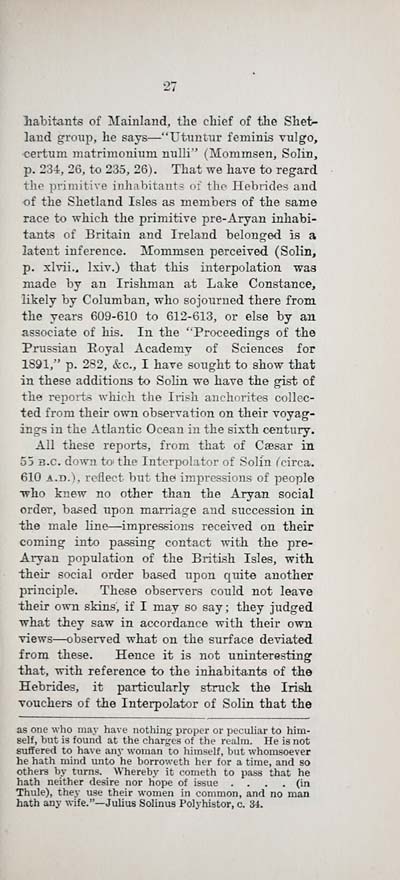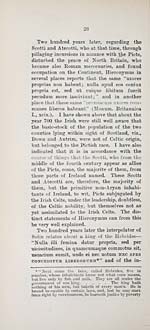Download files
Complete book:
Individual page:
Thumbnail gallery: Grid view | List view

habitants of Mainland, the chief of the Shet-
land srroup, he says — "Utuntnr feminis vulgo,
certum inatrimoniiim nnUi" (Mommsen, Solin,
p. 234, 26, to 235, 26). That we have to regard
the priinitive ijiliabitant= of the Hebrides and
of the Shetland Isles as members of the same
race to which the primitive pre- Aryan inhabi-
tants of Britain and Ireland belonged is a
latent inference. Mommsen perceived (Solin,
p. xlvii., Ixiv.) that this interpolation was
made by an Irishman at Lake Constance,
likely by Columban, who sojourned there from
the years 609-610 to 612-613, or else by an
associate of his. In the "Proceedings of the
Prussian Eoyal Academy of Sciences for
1891," p. 2S2, &c., I have sought to show that
in these additions to Solin we have the gist of
the reiiort-s which the Irish anclinrites collec-
ted from their own observation on their voyag-
ings in the Atlantic Ocean in the sixth century.
All these reports, from that of Caesar in
55 B.C. down to' the Interpolator of Solin ('circa.
610 A.n.), reflect but the impressions of people
who knew no other than the Aryan social
order, based upon marriage and succession in
the male line — impressions received on their
coming into passing contact ivith the pre-
Aryan population of the British Isles, with,
their social order based upon quite another
principle. These observers could not leave
their own skins, if I may so say ; they Judged
what they saw in accordance with their own
views — observed what on the surface deviated
from these. Hence it is not uninteresting
that, with reference to the inhabitants of the
Hebrides, it particularly struck the Iriah
vouchers of the Interpolator of Solin that the
as one who may ha\e nothing proper or peculiar to him-
self, but is found at the charges of the realm. He is not
suffered to have any woman to himself, but whomsoever
he hath mind unto he borroweth her for a time, and so
others by turns. Whereby it cometh to pass that he
hath neither desire nor hope of issue . . . . (in
Thule), they use their women in common, and no man
hath any wife."— Julius Solinus Polyhistor, c. 34.
land srroup, he says — "Utuntnr feminis vulgo,
certum inatrimoniiim nnUi" (Mommsen, Solin,
p. 234, 26, to 235, 26). That we have to regard
the priinitive ijiliabitant= of the Hebrides and
of the Shetland Isles as members of the same
race to which the primitive pre- Aryan inhabi-
tants of Britain and Ireland belonged is a
latent inference. Mommsen perceived (Solin,
p. xlvii., Ixiv.) that this interpolation was
made by an Irishman at Lake Constance,
likely by Columban, who sojourned there from
the years 609-610 to 612-613, or else by an
associate of his. In the "Proceedings of the
Prussian Eoyal Academy of Sciences for
1891," p. 2S2, &c., I have sought to show that
in these additions to Solin we have the gist of
the reiiort-s which the Irish anclinrites collec-
ted from their own observation on their voyag-
ings in the Atlantic Ocean in the sixth century.
All these reports, from that of Caesar in
55 B.C. down to' the Interpolator of Solin ('circa.
610 A.n.), reflect but the impressions of people
who knew no other than the Aryan social
order, based upon marriage and succession in
the male line — impressions received on their
coming into passing contact ivith the pre-
Aryan population of the British Isles, with,
their social order based upon quite another
principle. These observers could not leave
their own skins, if I may so say ; they Judged
what they saw in accordance with their own
views — observed what on the surface deviated
from these. Hence it is not uninteresting
that, with reference to the inhabitants of the
Hebrides, it particularly struck the Iriah
vouchers of the Interpolator of Solin that the
as one who may ha\e nothing proper or peculiar to him-
self, but is found at the charges of the realm. He is not
suffered to have any woman to himself, but whomsoever
he hath mind unto he borroweth her for a time, and so
others by turns. Whereby it cometh to pass that he
hath neither desire nor hope of issue . . . . (in
Thule), they use their women in common, and no man
hath any wife."— Julius Solinus Polyhistor, c. 34.
Set display mode to: Large image | Transcription
Images and transcriptions on this page, including medium image downloads, may be used under the Creative Commons Attribution 4.0 International Licence unless otherwise stated. ![]()
| Early Gaelic Book Collections > Hew Morrison Collection > Leabhar Nan Gleann > (39) |
|---|
| Permanent URL | https://digital.nls.uk/76888316 |
|---|
| Description | A selection of items from a collection of 320 volumes and 30 pamphlets of literary and religious works in Scottish Gaelic. From the personal library of Hew Morrison, the first City Librarian of Edinburgh. |
|---|
| Description | Selected items from five 'Special and Named Printed Collections'. Includes books in Gaelic and other Celtic languages, works about the Gaels, their languages, literature, culture and history. |
|---|

